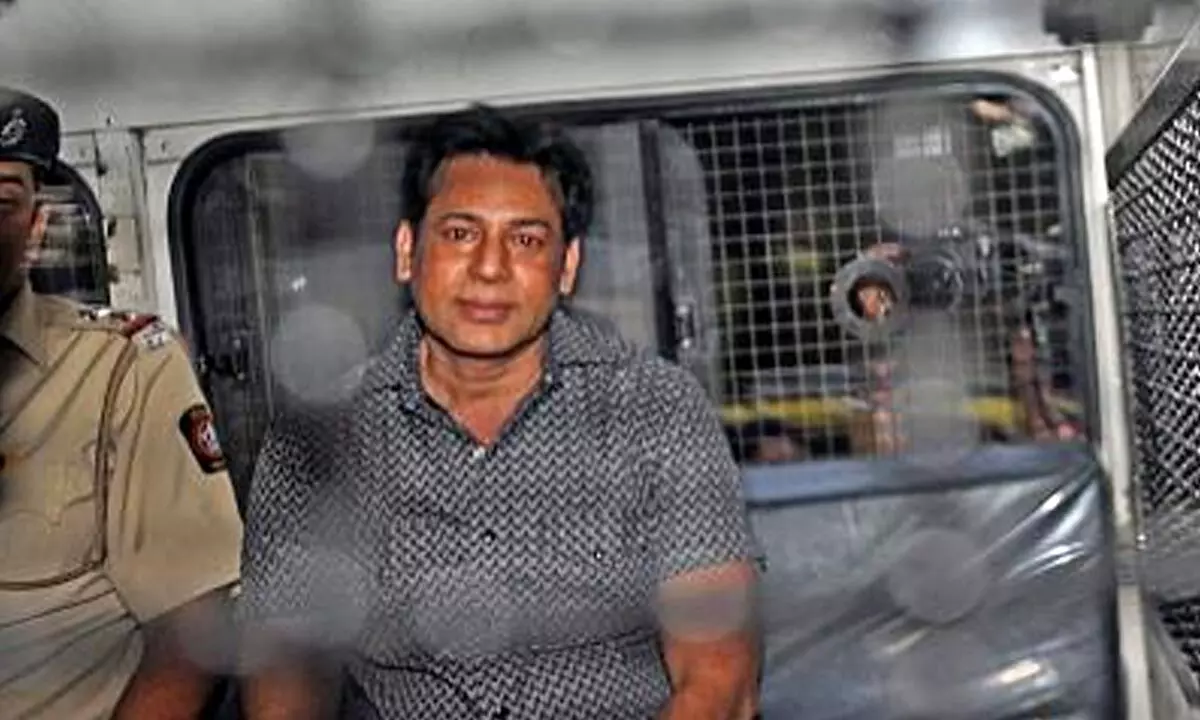Live
- How PM Modi championed Babasaheb’s ideals since early days, reveals Modi Archive
- Hyderabad: CAPF Constable Accuses Man of Repeated Rape Over Decade-Long Relationship
- Weight loss, diabetes drugs can also protect kidneys: Study
- Vedhika’s Award-Winning Thriller Fear Gears Up for a Grand Release on December 14
- Bengal Tiger ‘Madhu’ dies at SV Zoo Park
- Bhovi Development Corporation scam investigation transferred to CCB
- Constitution, a powerful protector of vulnerable sections: Rahul Gandhi
- 34 lakh vehicles, more than 15 years old, ply in Bengaluru
- BJP-JDS party workers believe Congress is the future: DKS
- Aishwarya Rai's Powerful Message Against Street Harassment: "My Body, My Worth"
Just In
Supreme Court reserves verdict on gangster Abu Salem's plea challenging life sentence


Supreme Court reserves verdict on gangster Abu Salem's plea challenging life sentence (Photo/IANS)
The Supreme Court on Thursday reserved its order on a plea by gangster Abu Salem claiming that, as per the extradition treaty between India and Portugal, his jail terms cannot extend beyond 25 years.
New Delhi: The Supreme Court on Thursday reserved its order on a plea by gangster Abu Salem claiming that, as per the extradition treaty between India and Portugal, his jail terms cannot extend beyond 25 years.
Advocate Rishi Malhotra, representing Abu Salem, contended before a bench headed by Justice Sanjay Kishan Kaul that the assurance was given to the Portugal government by the Indian government, that Abu Salem will not be either awarded death penalty or punished beyond 25 years, but, he has been sentenced to life imprisonment after being convicted in Mumbai serial bomb blasts.
The bench, also comprising Justice M.M. Sundresh, observed that the courts are not bound by the assurance given by the government, however the government may practice its executive power.
Malhotra submitted that Abu Salem was in custody in Portugal since 2002, and he was arrested following a 'Red Corner Notice'. He added that extradition process started in 2003 and went for almost 2 years -- and in 2005, he was handed over to India.
At this, the bench queried the Central government as to what would be the starting point of Abu Salem's detention.
Additional Solicitor General K.M. Nataraj, representing the Central government, said it will start by the time, when "we took him into custody and for the part of assurance, we'll consider it but on the part of the judiciary, it can be decided independently".
After hearing detailed arguments in the matter, the top court reserved its order on Salem's plea.
On April 21, the Supreme Court had strongly objected to some statements made by the Union Home Secretary, in an affidavit on honouring assurance made to Portugal during Abu Salem's extradition, saying the judiciary does not need "lecturing" from the Home Secretary in the matter.
Union Home Secretary Ajay Kumar Bhalla had told the court that the Indian government is bound by its assurance given to the Portugal government during the extradition of Abu Salem but the question of honouring its assurance will arise only when the period of 25 years is to expire.
"The government of India gave an assurance vide letter dated December 17, 2002, to the government of Portugal. This assurance is an executive assurance given by one country to other in the exercise of their executive functions.
"The period of 25 years which is mentioned in the assurance will be abided by the Union of India at an appropriate time subject to the remedies which may be available. The question of the Union of India honouring its assurance dated December 17, 2002, will arise only when the period of 25 years is to expire. This date is November 10, 2030," he had said in the affidavit.
The affidavit said before this date, the convict cannot raise any arguments based on the assurance, therefore the contention of the petitioner about non-compliance of assurance is premature and based on hypothetical surmises and can never be raised in present proceedings.
"The government of India will abide by the said assurance....subject to the rights which may be available at that stage. The attempt of convict-appellant to club that assurance with merits of the present case is legally untenable as the appeals need to be decided in accordance with Section 19 of the TADA read with other provisions governing criminal procedure," said the affidavit.

© 2024 Hyderabad Media House Limited/The Hans India. All rights reserved. Powered by hocalwire.com






